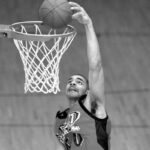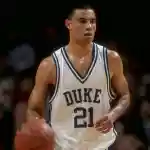Editor's Note: Everyone in high school basketball knows about the Boozer twins, Cameron and Cayden, of Columbus (Miami, Fla.). Cam Boozer was the first ever sophomore named Mr. Basketball USA as the national player of the year in 2022-23. Not as many know their father, former NBA forward Carlos Boozer, was a big name in high school basketball in the late 1990s with a unique story. This cover story was originally published in the April 1999 edition of Student Sports Magazine.
He’s seen bears in the wild and his mom has served moose meat to college coaches, but what has really touched high school basketball All-American Carlos Boozer is the overwhelming support he’s received from thousands of fans throughout Alaska.
THE KING OF ALASKA
by Tracy Pierson
It sounds like we’re talking about a celebrity on the level of Michael Jordan or Leonardo DiCaprio. But while this figure might not necessarily be King of the World, he’s definitely King of Alaska. He's actually just a soft-spoken, fairly shy, 17-year-old high school senior named Carlos Boozer from Juneau, Alaska. Carlos also happens to play basketball better than just about any other high schooler on the continent. And the state of Alaska has adopted him as its hero.
“He’s truly a celebrity in Juneau and all of Alaska,” said his high school coach, George Houston. “He’s kind of swept up the entire state.”
It’s not unjustified. Boozer led his high school team, the Juneau Douglas Bears, to the Alaska 4-A state title as a sophomore and junior, in particularly dramatic fashion. Last year, the Bears beat longtime basketball power East Anchorage in the championship game on, of course, a last second shot by Boozer.
He can’t even go into a department store without being mobbed. He’s constantly on the front of newspapers. When he makes a casual public appearance, they have to set up tables for him to sign autographs. This season, Boozer and the Bears were favored to win a third consecutive state title, and the people of Alaska are intensely following Douglas’ season, primarily because of their athletic favorite son.
All the national attention Carlos has received has made the local spotlight even brighter. Some of the biggest coaching names in college basketball—including Mike Krzyzewski of Duke, Steve Lavin of UCLA, Mike Jarvis of St. John's, Roy Williams of Kansas, and many more—have earned a ton of frequent flyer miles coming to Juneau, the Alaskan capital and seaport that is nestled on the southeast coast of the state with a population of 25,000.
In the fall, eight college head coaches—Krzyzewski, Lavin, and Georgetown’s John Thompson among them—made official in-home visits to the Boozer household. Carlos’ father, Carlos Sr., said the coaches all told him it was a unique experience for them: flying to Juneau, glimpsing glaciers, driving around sheep in the street.
“Especially when my wife served them moose-meat hor d’oeuvres,” laughed Carlos Sr. “It’s all been such a fun ride...the state championships, the recruiting visits."
Carlos Jr. is the hottest recruiting commodity in the country heading into the spring signing period. He trimmed his potential choices to Duke, UCLA and St. John’s and was making each sweat it out before announcing his decision on Easter Sunday, April 4, before he plays in the Magic Johnson Roundball Classic All-Star Game in Detroit, Mich.
Among coaches and scouts alike, Boozer is widely considered one of the top five players in the country and was recently named to the 1999 McDonald’s All-American squad, only the second player from Alaska ever to be named to the prestigious team.
Boozer is a potential NBA lottery pick caliber player: he stands a hair under 6-10 while tipping the scales at 245 pounds with a muscular built. He not only can use his man-child type body to dominate under the basket, but possesses uncanny perimeter skills for someone his size. He can drill a 3-point shot with ease, take a defender with a crossover, or go end to end running the court like a sprinter. Having also just turned 17 in November, he’s also very young for a senior.
No one could have foreseen the teenager’s meteoric rise eleven years ago (in 1988). At the time, the Boozers were living in Washington, D.C., as Carlos Sr. was a computer analyst for an armored car company and his wife, Renee Boozer, had a well-paying government job.
Carlos Sr., however, was troubled by life in the city, especially with the prospect of raising his children there.
“We were tired of the D.C. area,” Carlos Sr. explained. “I just wasn’t comfortable with the prospect of living there when my kids hit high school age. Nothing against D.C., it was more just the city lifestyle. How everything is so fast. But I didn’t know what to do.”
Shortly thereafter, the patriarch took his family on a vacation to visit his sister in Juneau. His sister had been raving about life in Alaska for a few years and the Boozers wanted to check it out. Who would have thought that it could all happen in Alaska?
“We drove cross country about 4,000 miles,” he said. “And when we got here, we just fell in love with the place.”
The Boozers appreciated the relaxed Alaskan lifestyle compared to the frenetic pace of Washington D.C. They saw moose in their relatives’ backyard, eagles flying overhead and noticed how friendly and polite the Alaskan people were to them. Within a few days, both parents were calling their employers in D.C. to submit their resignations.
“We never went back to D.C.,” Carlos Sr. said. "“We came out on a vacation to Alaska and just decided to stay.”
The Boozers took entry-level jobs, suffering substantial pay cuts compared to their positions in D.C.
“But it was well worth it,” Carlos Sr., now an analyst in Alaska’s Department of Labor, explained. “It was the best decision I could have made for my family.”
For Carlos Jr., moving from Washington D.C. to Alaska was a National Geographic adventure come to life.
“I was just six years old, so moving was fun. You could see bears walking around. That was neat. You could only see those kind of animals in D.C. at the zoo. So, for me and my older sister, it was fascinating."
Carlos Jr. was much taller than others his age but had just a passing interest in basketball. In fact, most of the time when he was really young, he preferred a snow-rugby version of basketball to the real thing.
“On the outside courts in Alaska, there was so much snow we used to play completely wrapped up in clothes, with gloves, running through the piles of snow. It was great, you could dive, Larry Bird style, and land in the snow and not get hurt.”
Carlos Sr. said he could see early on that his had some talent, but he resisted pushing him. The father himself had a basketball history, having played two years at Maryland in the early 1970s under coach Lefty Driesel as a 6-3 forward, and in the military, making an all-army team. At the age of nine, Carlos Jr. came to his father and asked him if he’d teach him how to play basketball.
“I said, ‘Hallelujah,’” Carlos Sr. chuckled. “I took it as a mission. I had this tall, talented kid who now wanted to learn. So, I taught him everything I knew."
For the first few years in Alaska, Carlos Jr. was just an ordinary kid. Then nature took over.
Between the seventh and eighth grades, Carlos Jr. grew from 5-7 to 6-2—seven inches in just a year. He quickly stood out in a crowd and on a basketball court. He dunked the ball for the first time as an eighth grader and in Alaska, where the entire state has a small-town mentality, word started to spread around Juneau and neighboring towns about a very tall, talented junior high prospect to watch.
“I think that was the first time someone ever came up to me on the street and recognized me,” Carlos Jr. said. “It kind of freaked me out.”
By the summer before his freshman year, Carlos had grown to 6-3 and was already fairly well-known, but his parents realized that being a star in Alaska might not be enough to get him noticed by anyone outside of the state. Renee then accompanied her young, soft-spoken son to the San Francisco Bay Area to play in a basketball camp. It was directed by a young assistant coach from UCLA, Steve Lavin, and other members of Lavin’s family. Lavin became the Bruins’ head coach three years ago.
“I remember thinking, ‘Wow, there are so many good players in the world,’” the D.C. transfer stated. “I was overwhelmed. It was the first time I was exposed to players outside of Alaska. It was the summer after UCLA won their national championship, and the O’Bannon Brothers (Ed, Charles) were there and I got to meet them. I saw the ring on Coach Lavin’s finger and I thought that was really cool. That inspired me.”
The following spring, after Carlos’ freshman season, Mrs. Boozer took her then 6-5 son to Los Angeles to play at the West Coast Camp. Her primary objective was to find a traveling AAU team for Carlos Jr. and to get him more than just the Northern Exposure he’d had in Alaska.
The coach of a Fresno-based AAU team, Elite Basketball Organization (EBO), Darren “Mats” Matsubara, was also there. Matsubara said the way he first discovered Boozer was a matter of fate and luck.
“I had heard that there was a parent interested in EBO for her son,” Matsubara said. “I watched him play, but in the program, after his name it listed ‘SR,’ which I thought meant he was a senior. When Renee approached me, I told her I thought her son was good, but as a senior he probably couldn’t play for us. She then pointed out that it was a typo, that it was supposed to say ‘FR.’ I thought, ‘Holy Cow!’ Not only was this big, talented kid a freshman, he was a young freshman, then only 14-years-old. All the other AAU coaches didn’t consider him seriously since they thought like me that he was a senior."
The budding youth decided to join EBO, one of the premiere AAU programs nationwide, and his reputation began to blossom. By his sophomore year, Boozer was 6-7 and had led Douglas High to the 4-A state championship. The state of Alaska quickly jumped on the Boozer bandwagon and while basketball had always been important in Juneau, Houston said Carlos Jr. made its popularity explode.
“Suddenly, this was a basketball town. We were not only filling our own gym, but every gym we visited. Standing room only, like over 5,000 people a game. Carlos was getting his picture in the paper on a regular basis, and having stories done about him on local television. Now, this might happen in other towns in America, but when it happens in Juneau, it’s even a bigger thing, a phenomenon.”
Boozer was swiftly becoming the biggest thing in Alaska since... well, the “Alaskan Assassin” himself—Duke’s hot-shooting, All-American guard Trajan Langdon. Trajan was the original Alaskan high school basketball phenom, attracting the same caliber of attention that is now Boozer’s. In fact, their careers have paralleled to a large degree:
--- Langdon took his game to Duke, a destination that Carlos is seriously considering.
--- Langdon won three state championships for East Anchorage High (which Douglas beat in the championship game last year), a feat Carlos was expected to match this season. Coincidentally, Houston coached East at the time and after last year's game among the Juneau crowd Langdon found him. “He came up to me, we talked, he thanked me and we embraced," Houston said. "With all the celebrating going on, that meant a lot to me... to think of his coach at a time like that.”
--- Langdon was the first high school player from Alaska to be selected to the McDonald’s All-America team; Boozer is now the second. “Trajan opened the doors for so many players in Alaska like me,” Carlos explained. “He made many Alaskans basketball fans. All of us All-Americans who have followed him are indebted to him.”
Houston, though, said that Boozer has taken that popularity to another level.
“With high school basketball having a higher profile now, and with more television coverage and the internet, Carlos, I think, is even bigger than Trajan was when he was in high school. I mean, when Carlos was just named to the McDonald’s team, it was on the front page of the Juneau paper.”
“He’s the mayor up there,” said Matsubara.
Carlos also is a solid student, carrying a 3.3 GPA and scoring over 900 on the SAT. But with all the attention, the modest student-athlete hasn’t let it go to his head. While he could probably score 50 points a game and destroy his Alaskan competition with every touch of the ball, he still plays within the team concept.
“He’s first and foremost a team player,” Houston said. “He does what we want him to do to make sure the team wins.”
“My family has emphasized academics my whole life,” Carlos Jr. said. “I knew growing up if I didn’t get good grades, I couldn’t play basketball, no matter how good I was.”
Houston, in fact, emphasizes the quality of a person Carlos is above all else. He readily relates the story that after Carlos made the winning shot in the state championship game last year, the floor—and Carlos—were mobbed with fans, cheerleaders and players. Carlos, however, quietly broke away from the raucous.
Did moving to Alaska give him such a strong foundation of values?
Boozer attributes it to his close-knit family, emphasizing his relationships with his father and mother, his older sister, Natasha, 19, and his younger siblings, Charles, 11, Nakeisha, 8, and Natonya, 6. Incidentally, some feel—including Carlos Jr. himself—that the college coaches should keep their flight schedules to Alaska since Charles is better at the same age.
But Carlos Jr. also believes growing up in Alaska contributed to his outlook on life.
“It’s just a different world up here. The people are so friendly and trustworthy. It’s peaceful. You can really relax and be yourself. It does tend to affect you, make you put things in perspective.”
And from the perspective of the majority of basketball fans in Alaska, Carlos Boozer is The King.
CARLOS BOOZER NBA HIGHLIGHTS
— John Brisker (@JohnBrisker2021) November 20, 2022


